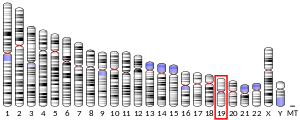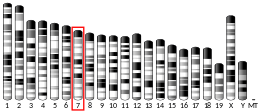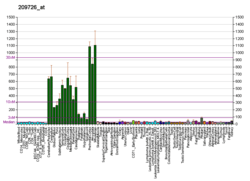CA11
Carbonic anhydrase-related protein 11 is an enzyme that in humans is encoded by the CA11 gene.[5][6]
| CA11 | |||||||||||||||||||||||||
|---|---|---|---|---|---|---|---|---|---|---|---|---|---|---|---|---|---|---|---|---|---|---|---|---|---|
| |||||||||||||||||||||||||
| Identifiers | |||||||||||||||||||||||||
| Aliases | CA11, CARPX1, carbonic anhydrase 11, CA-RP II, CA-RP, CARP-2, CA-XI | ||||||||||||||||||||||||
| External IDs | OMIM: 604644 MGI: 1336193 HomoloGene: 36061 GeneCards: CA11 | ||||||||||||||||||||||||
| |||||||||||||||||||||||||
| |||||||||||||||||||||||||
| |||||||||||||||||||||||||
| Orthologs | |||||||||||||||||||||||||
| Species | Human | Mouse | |||||||||||||||||||||||
| Entrez | |||||||||||||||||||||||||
| Ensembl | |||||||||||||||||||||||||
| UniProt | |||||||||||||||||||||||||
| RefSeq (mRNA) | |||||||||||||||||||||||||
| RefSeq (protein) | |||||||||||||||||||||||||
| Location (UCSC) | Chr 19: 48.64 – 48.65 Mb | Chr 7: 45.7 – 45.7 Mb | |||||||||||||||||||||||
| PubMed search | [3] | [4] | |||||||||||||||||||||||
| Wikidata | |||||||||||||||||||||||||
| |||||||||||||||||||||||||
Function
Carbonic anhydrases (CAs) are a large family of zinc metalloenzymes that catalyze the reversible hydration of carbon dioxide. They participate in a variety of biological processes, including respiration, calcification, acid-base balance, bone resorption, and the formation of aqueous humor, cerebrospinal fluid, saliva, and gastric acid. They show extensive diversity in tissue distribution and in their subcellular localization. CA XI is likely a secreted protein, however, radical changes at active site residues completely conserved in CA isozymes with catalytic activity, make it unlikely that it has carbonic anhydrase activity. It shares properties in common with two other acatalytic CA isoforms, CA VIII and CA X. CA XI is most abundantly expressed in brain, and may play a general role in the central nervous system.[6]
Interactions
CA11 has been shown to interact with RIPK1.[7]
References
- GRCh38: Ensembl release 89: ENSG00000063180 - Ensembl, May 2017
- GRCm38: Ensembl release 89: ENSMUSG00000003273 - Ensembl, May 2017
- "Human PubMed Reference:". National Center for Biotechnology Information, U.S. National Library of Medicine.
- "Mouse PubMed Reference:". National Center for Biotechnology Information, U.S. National Library of Medicine.
- Lovejoy DA, Hewett-Emmett D, Porter CA, Cepoi D, Sheffield A, Vale WW, Tashian RE (December 1998). "Evolutionarily conserved, "acatalytic" carbonic anhydrase-related protein XI contains a sequence motif present in the neuropeptide sauvagine: the human CA-RP XI gene (CA11) is embedded between the secretor gene cluster and the DBP gene at 19q13.3". Genomics. 54 (3): 484–93. doi:10.1006/geno.1998.5585. PMID 9878252.
- "Entrez Gene: CA11 carbonic anhydrase XI".
- Liao W, Xiao Q, Tchikov V, Fujita K, Yang W, Wincovitch S, Garfield S, Conze D, El-Deiry WS, Schütze S, Srinivasula SM (May 2008). "CARP-2 is an endosome-associated ubiquitin ligase for RIP and regulates TNF-induced NF-kappaB activation". Curr. Biol. 18 (9): 641–9. doi:10.1016/j.cub.2008.04.017. PMC 2587165. PMID 18450452.
External links
- Human CA11 genome location and CA11 gene details page in the UCSC Genome Browser.
Further reading
- Bellingham J, Gregory-Evans K, Gregory-Evans CY (1998). "Sequence and tissue expression of a novel human carbonic anhydrase-related protein, CARP-2, mapping to chromosome 19q13.3". Biochem. Biophys. Res. Commun. 253 (2): 364–7. doi:10.1006/bbrc.1998.9449. PMID 9878543.
- Fujikawa-Adachi K, Nishimori I, Taguchi T, Yuri K, Onishi S (1999). "cDNA sequence, mRNA expression, and chromosomal localization of human carbonic anhydrase-related protein, CA-RP XI". Biochim. Biophys. Acta. 1431 (2): 518–24. doi:10.1016/S0167-4838(99)00067-9. PMID 10350627.
- Okamoto N, Fujikawa-Adachi K, Nishimori I, Taniuchi K, Onishi S (2001). "cDNA sequence of human carbonic anhydrase-related protein, CA-RP X: mRNA expressions of CA-RP X and XI in human brain". Biochim. Biophys. Acta. 1518 (3): 311–6. doi:10.1016/s0167-4781(01)00193-2. PMID 11311946.
- Taniuchi K, Nishimori I, Takeuchi T, Fujikawa-Adachi K, Ohtsuki Y, Onishi S (2002). "Developmental expression of carbonic anhydrase-related proteins VIII, X, and XI in the human brain". Neuroscience. 112 (1): 93–9. doi:10.1016/S0306-4522(02)00066-0. PMID 12044474.
- Clark HF, Gurney AL, Abaya E, Baker K, Baldwin D, Brush J, Chen J, Chow B, Chui C, Crowley C, Currell B, Deuel B, Dowd P, Eaton D, Foster J, Grimaldi C, Gu Q, Hass PE, Heldens S, Huang A, Kim HS, Klimowski L, Jin Y, Johnson S, Lee J, Lewis L, Liao D, Mark M, Robbie E, Sanchez C, Schoenfeld J, Seshagiri S, Simmons L, Singh J, Smith V, Stinson J, Vagts A, Vandlen R, Watanabe C, Wieand D, Woods K, Xie MH, Yansura D, Yi S, Yu G, Yuan J, Zhang M, Zhang Z, Goddard A, Wood WI, Godowski P, Gray A (2003). "The secreted protein discovery initiative (SPDI), a large-scale effort to identify novel human secreted and transmembrane proteins: a bioinformatics assessment". Genome Res. 13 (10): 2265–70. doi:10.1101/gr.1293003. PMC 403697. PMID 12975309.
- Liu T, Qian WJ, Gritsenko MA, Camp DG, Monroe ME, Moore RJ, Smith RD (2006). "Human plasma N-glycoproteome analysis by immunoaffinity subtraction, hydrazide chemistry, and mass spectrometry". J. Proteome Res. 4 (6): 2070–80. doi:10.1021/pr0502065. PMC 1850943. PMID 16335952.




